Tabloid stories, ‘the boss’ and Stormy Daniels in Trump Tower: Key takeaways from the first week of Trump’s trial testimony
It was an eventful first week of testimony in Donald Trump’s criminal trial – complete with testimony from a tabloid boss, gag order fine threats and the former president’s characteristic rants
Your support helps us to tell the story
From reproductive rights to climate change to Big Tech, The Independent is on the ground when the story is developing. Whether it's investigating the financials of Elon Musk's pro-Trump PAC or producing our latest documentary, 'The A Word', which shines a light on the American women fighting for reproductive rights, we know how important it is to parse out the facts from the messaging.
At such a critical moment in US history, we need reporters on the ground. Your donation allows us to keep sending journalists to speak to both sides of the story.
The Independent is trusted by Americans across the entire political spectrum. And unlike many other quality news outlets, we choose not to lock Americans out of our reporting and analysis with paywalls. We believe quality journalism should be available to everyone, paid for by those who can afford it.
Your support makes all the difference.This week was Donald Trump’s second week on criminal trial – the first of courtroom testimony – and it was certainly eventful.
Jurors heard from the prosecution’s first witnesses in the case including lengthy testimony from tabloid mogul David Pecker, who outlined the “catch and kill” scheme at the heart of the hush money case.
The former president faced calls for $10,000 fines over gag order violations over his continued attacks on witnesses.
And Americans heard Mr Trump both fume about the landmark trial and use it as a campaign platform on Truth Social and in the courthouse corridors.
Mr Trump is charged with 34 counts of falsifying business records related to hush money payments made to adult film star Stormy Daniels ahead of the 2016 election, in order to stop her coming forward with allegations of a 2006 affair.
Here are the key takeaways from the week:
Day one
Prosecutors lay out ‘criminal conspiracy and cover-up’
During opening statements on Monday, prosecutors were direct in laying out the heart of the case, with Manhattan Assistant District Attorney
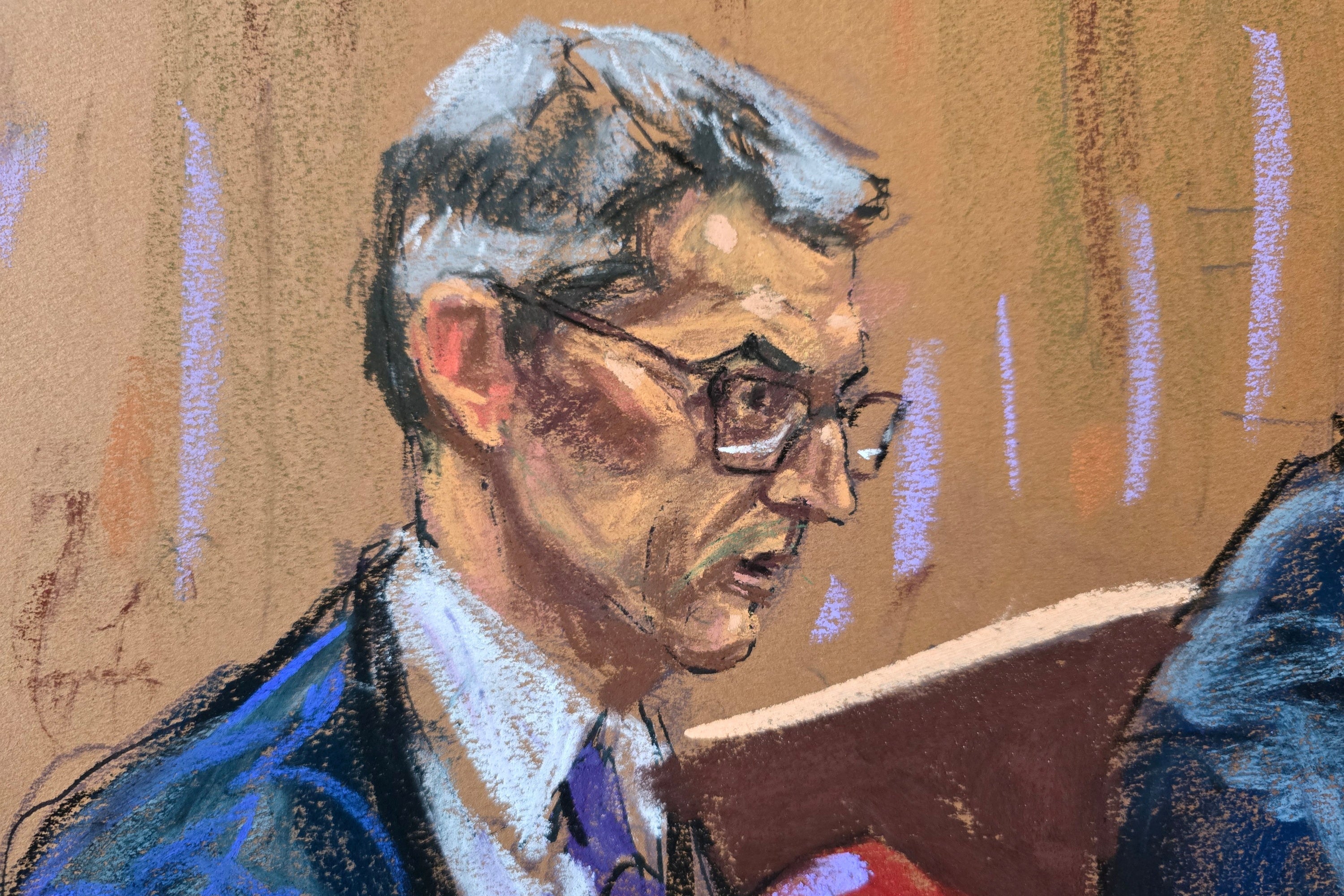
telling jurors it was about “a criminal conspiracy and a cover-up”.
“The defendant Donald Trump orchestrated a criminal scheme to corrupt the 2016 presidential election. Then he covered up that criminal conspiracy by lying in his business records, over and over and over again,” Mr Colangelo continued.
The prosecutor then laid out the “catch-and-kill” scheme, arranged between Mr Trump’s former attorney Michael Cohen and Mr Pecker to block negative press about Mr Trump.
Mr Colangelo told the jury that while “no politician wants bad press,” evidence will show “this was a planned, coordinated, long-running conspiracy”. “It was election fraud. Pure and simple,” he said.
Defence tries to humanise Trump
In the defence’s opening statement, lead attorney Todd Blanche tried to humanise Mr Trump — while still vowing to “refer to him as President Trump”.
“This is a title he has earned,” Mr Blanche said.
But he’s not just the former president, the defence attorney continued. “He’s not just Donald Trump that you’ve seen on TV or read about or seen photos of. He’s also a man, he’s a husband, he’s a father. And just like me,” said Mr Blanche.
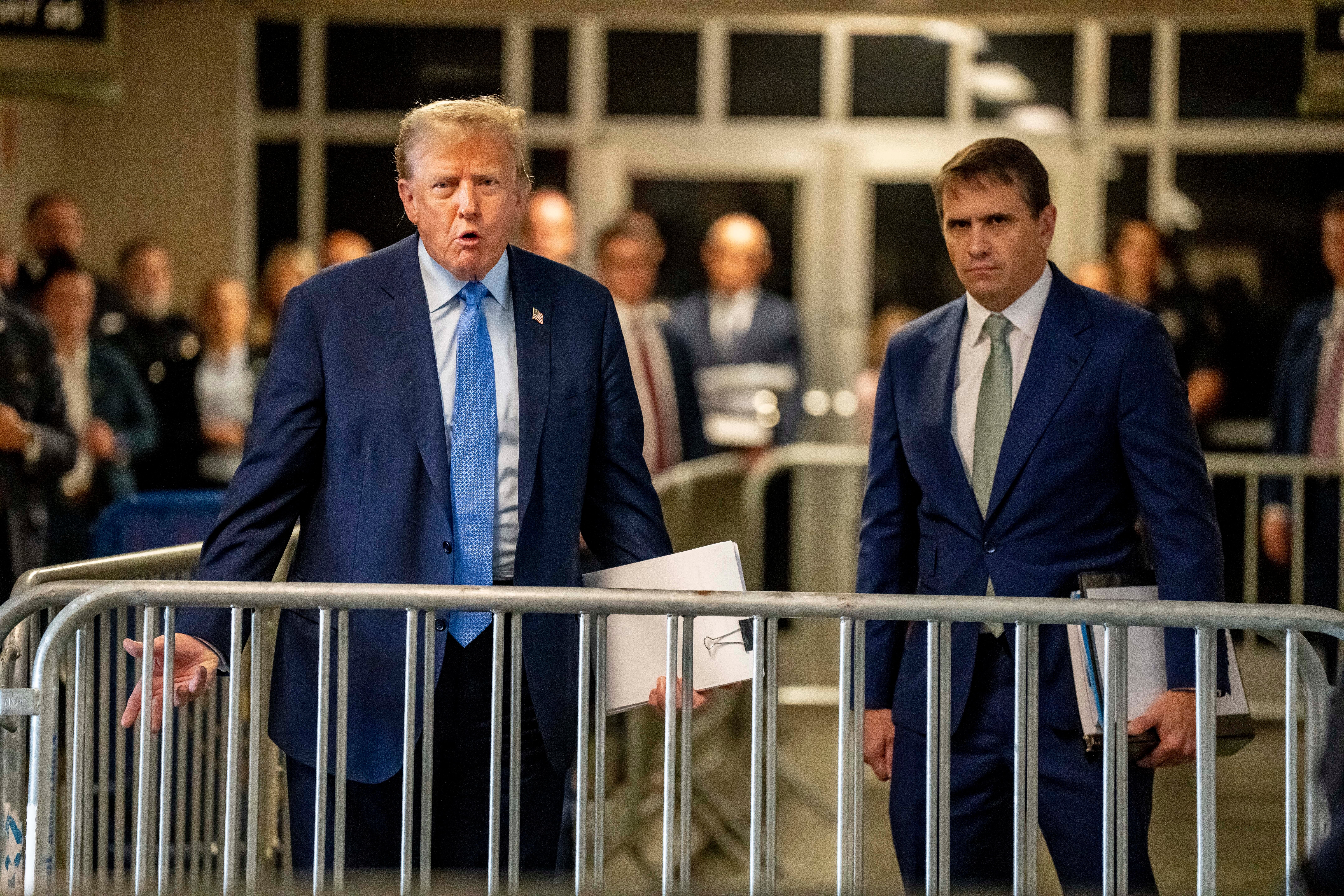
“President Trump is innocent. President Trump did not commit any crimes. The Manhattan District Attorney’s office should have never brought this case.”
Mr Blanche also tried to discredit the prosecution’s star witness in the case, Michael Cohen, stressing his 2018 guilty plea for lying to Congress and that he had been found liable for perjury in the past.
On top of this, Mr Blanche argued that Cohen is “obsessed” with Mr Trump.
Cohen’s “financial livelihood depends on President Trump’s destruction,” according to Mr Blanche. “He cannot be trusted.”
Day two
Potential gag order violations
Judge Juan Merchan held an hour-long hearing around potential gag order violations.
Prosecutors accused Mr Trump of violating the gag order, which bars him from making public statements about potential witnesses, court staff and the families of the judge and DA, on at least 10 different occasions.
Defence attorney Todd Blanche meanwhile argued that Mr Trump’s posts were responding to “political” attacks. However, he failed to provide any example of what Mr Trump was responding to, leading to a scolding from the judge.
“You presented nothing,” a frustrated Judge Merchan said. “You’re losing all credibility, I’ll tell you that right now.”
The judge also warned Mr Trump directly against intimidating jurors in his courtroom.
The judge has yet to make a ruling on the alleged gag order breaches. Prosecutors suggested imposing a $10,000 fine against Mr Trump and ordering him to remove the offending posts, noting they have “not yet” asked for jail time.
The threat of penalty hasn’t deterred Mr Trump from continuing to rant about the case on Truth Social and to reporters as he enters and exits the courtroom.
A behind-the-scenes look at tabloid journalism
In his testimony, Mr Pecker provided a peek behind the curtain on what was happening at some of his tabloids.
Mr Pecker described a “mutually beneficial” scheme to keep the National Enquirer jam-packed with stories boosting Mr Trump’s 2016 election odds while ensuring “negative” stories never saw the light of day.
As part of the arrangement, Mr Pecker would notify Cohen of any unflattering stories about the candidate – particularly those involving women. Since Mr Trump “was well-known as the most eligible bachelor, dating the most beautiful women, and it was clear based on my past experiences that when someone is running for office like this, it is very common for these women to call up a magazine like the National Enquirer to try and sell their stories,” the former publisher testified.
Writing positive stories about Mr Trump and negative stories about his opponents “would help him and it would help me,” Mr Pecker explained – as it would help him sell his tabloids.
Jurors were shown a number of positive National Enquirer headlines and covers about Mr Trump, like “DONALD TRUMP: HEALTHIEST INDIVIDUAL EVER ELECTED!” They were also shown negative ones about his 2016 GOP primary opponents, like “DONALD TRUMP BLASTS TED CRUZ’S DAD FOR PHOTO WITH JFK ASSASSIN.”
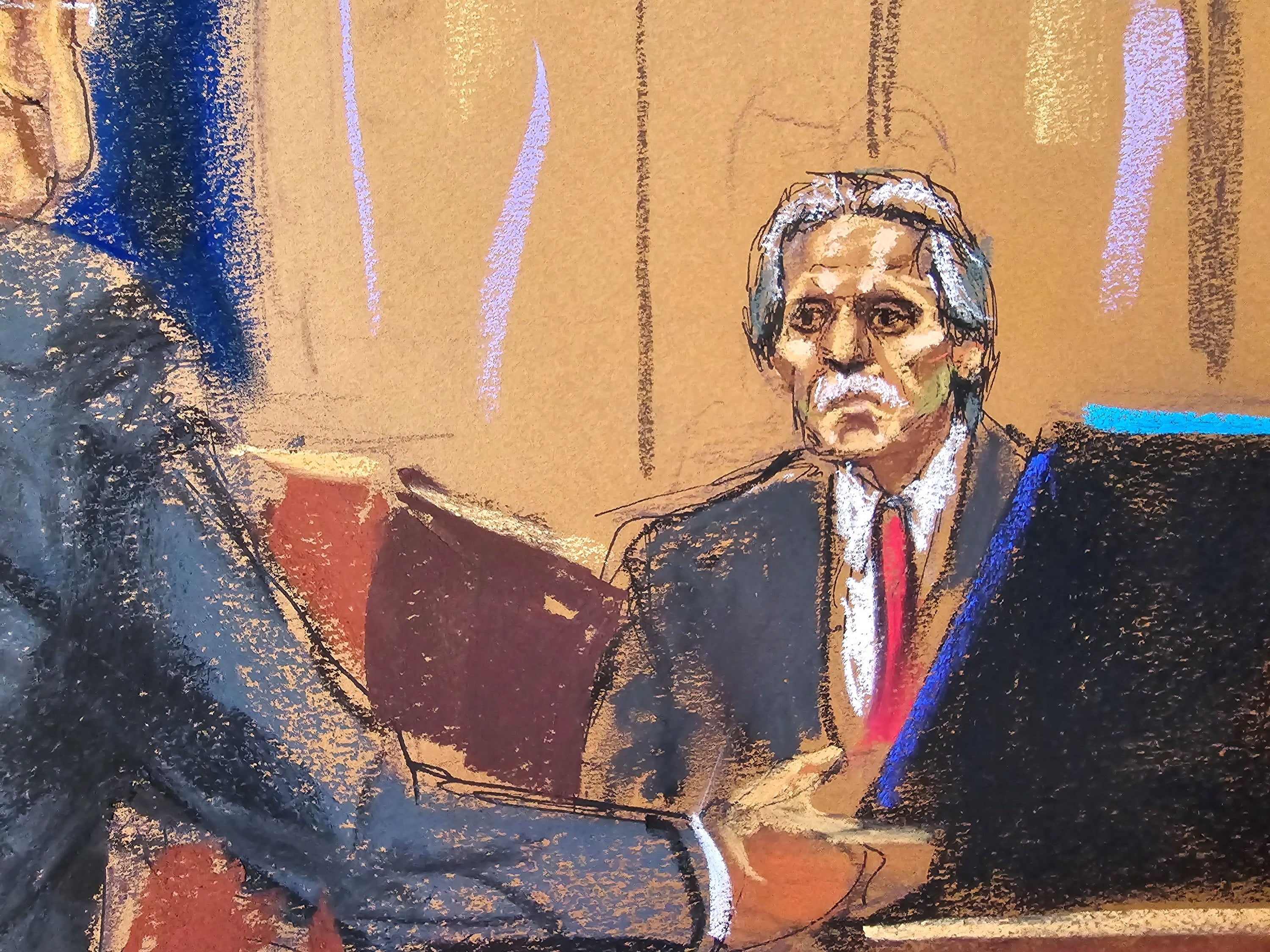
Doorman’s story about a love child
Jurors heard how the scheme was first put into practice after a former Trump World Tower doorman, Dino Sajudin, claimed that the then-2016 candidate had a love child with a maid working at Trump Tower.
Mr Pecker testified that Dylan Howard, then editor-in-chief of the National Enquirer, told him that “Dino was in the market for selling a story and so he called Cohen to tell him. Cohen told Mr Pecker it was “absolutely not true” but that he would look into it, he testified.
“I asked Dylan to negotiate a price, negotiate a number, to buy the story and take it off the market,” he said.
Mr Pecker told the court they agreed upon $30,000 for the story and Cohen told him that “the boss was very pleased,” referring to Mr Trump.
“I thought it was very important that Dino wouldn’t be shopping the story to other media outlets,” he told the court.
However, he then revealed his more selfish motivation for the transaction — if he could have verified the story, he would have published it. “It would probably be the biggest sale of the National Enquirer since the death of Elvis Presley,” Mr Pecker said.
Day three
How Playboy model affair story unfolded
During the third day of testimony, Mr Pecker shed light on how he came across former Playboy model Karen McDougal’s story — that she had a 10-month affair with Mr Trump in 2006, one year after he had married Melania.
Mr Howard had interviewed Ms McDougal, learning of the alleged affair and how Mr Trump apparently called her a “12 out of 10,” Mr Pecker told the court.
Although Mr Howard warned there was “no corroborating evidence”, Mr Pecker said he “believed the story to be true”. He testified that he initially offered the former model $10,000 to buy the story but she turned it down.
Mr Howard later told Mr Pecker that ABC was interested in buying Ms McDougal’s story, but that “I knew from my experience that ABC doesn’t buy stories”.
Mr Howard had concluded that Ms McDougal didn’t want the story to be published. “She said she didn’t want to be the next Monica Lewinsky,” Mr Pecker added.
‘The boss will take care of it’
During testimony about buying the rights to these stories, Mr Pecker told the court about his interactions with Mr Trump on the matters – directly linking the criminal defendant to the arrangements.
Cohen had given Mr Pecker the green light to pay the former Playboy model $150,000 for the rights to her story, Mr Pecker told the court.
“Don’t worry about it. I’m your friend. The boss will take care of it,” Mr Pecker recalled Cohen telling him, inferring that “the boss” meant Mr Trump.
Mr Pecker recalled another occasion after he had won the 2016 election, when Mr Trump asked him: “How’s our girl?” referring to Ms McDougal. Mr Trump also thanked him for handling the McDougal story and “the doorman situation,” he told the court.
“He said the stories would be very embarrassing … to him, his family and the campaign,” Mr Pecker testified.
Mr Trump even invited the former tabloid boss to a “thank you dinner” at the White House to show his gratitude for killing damaging stories, Mr Pecker testified – testimony that shone a light on how the former president used his position in the White House to manage blowback from the scheme.
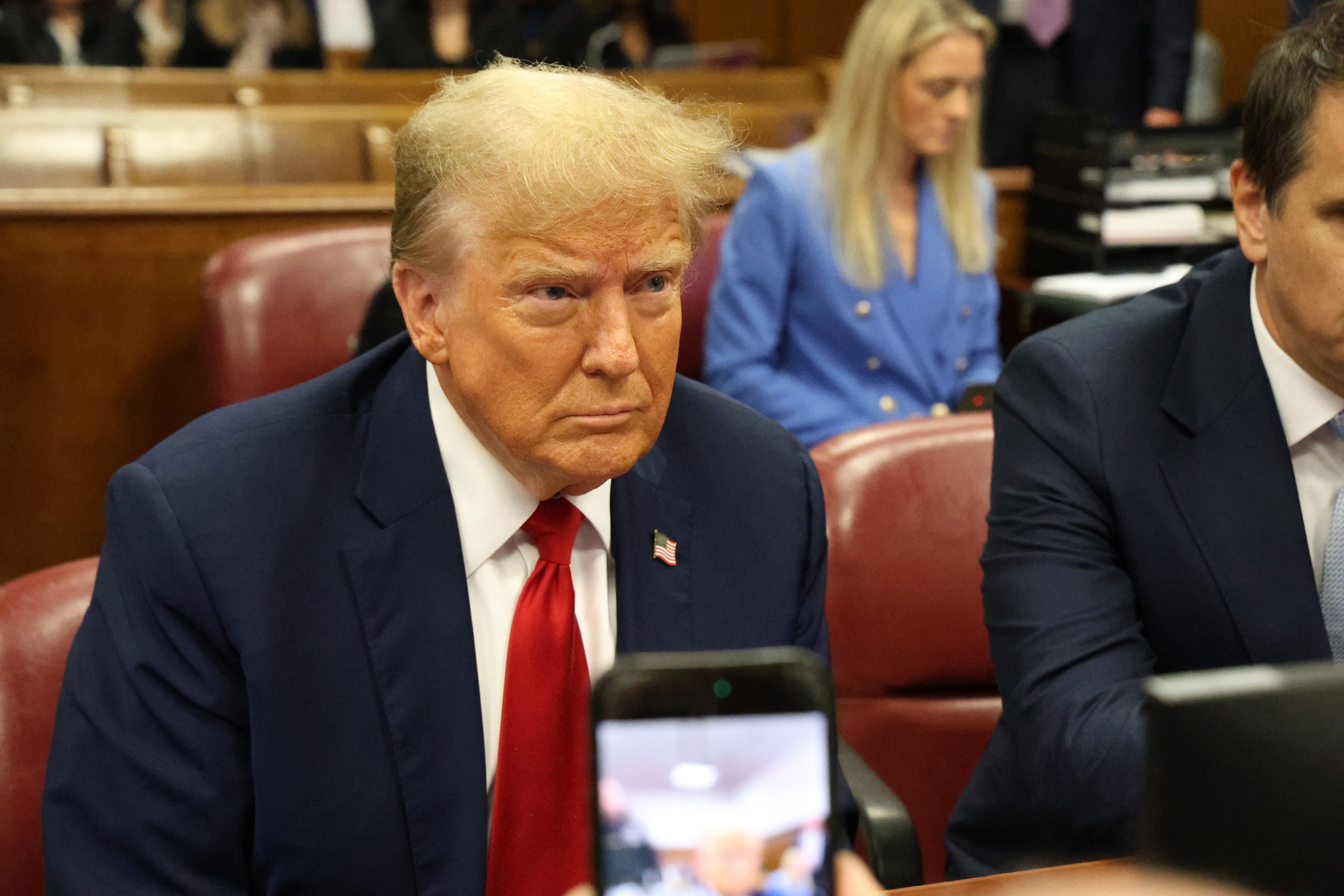
Trump was ‘very upset’ when McDougal affair story leaked
Despite the substantial efforts to block other outlets from getting access to Ms McDougal’s story, it did eventually become public – and, according to Mr Pecker, this made Mr Trump “very upset”.
The Wall Street Journal published an article just days before Election Day in 2016, unleashing the blockbuster story.
Mr Pecker recalled Mr Trump phoning him, “very upset, saying, ‘How could this happen? I thought you had this under control.’”
Mr Pecker testified that AMI’s deal with Ms McDougal was “for the lifetime rights” to her story. Mr Pecker recalled then telling Cohen that the deal was off after his conversations with counsel about the transaction. “He was very, very angry, very upset, screaming basically at me,” Mr Pecker said. He recalled Cohen saying: ‘The boss will be very angry with you.”
To this day, the publisher has never been reimbursed, Mr Pecker said on the stand.
Celebrities dragged into the case
During the former AMI chief’s testimony, several celebrities and high-profile figures were dragged into the case, including Rahm Emanuel, Mark Wahlberg and Tiger Woods.
But one person in particular set the stage for Mr Pecker’s wariness to conceal politically-linked stories: The Terminator star Arnold Schwarzenegger. Mr Pecker said he had struck up an arrangement with the actor to conceal compromising stories about him when he was campaigning to become governor of California – long before the publisher’s dealings with Mr Trump.
Mr Pecker recalled Schwarzenegger saying: “I plan on running for governor and I would like you to not publish any negative stories about me now and in the future, and I’ll continue being the editor of Muscle & Fitness and Flex and be a spokesperson.” Mr Pecker said he agreed to the arrangement.
When the actor announced his gubernatorial bid, “a number of women called up the National Enquirer” with stories to sell on “different relationships, or contacts, or sexual harassment that they felt that Arnold Schwarzenegger did”, the former publisher testified. Mr Pecker outlined the agreement: “I would call him and advise [Schwarzenegger] of other stories that were out there and I would…buy them for a period of time.”
This experience “made me sensitive about buying any stories in the future. That’s how I became sensitive about this topic,” Mr Pecker told the court.
None of the celebrities are accused of any wrongdoing in the case.
First mention of Stormy Daniels
Stormy Daniels’ name cropped up in Mr Pecker’s testimony for the first time on Thursday when he told the court that Cohen had come to him asking for his help to get Mr Trump to pay him his bonus.
“I understood he was complaining that he had not been repaid,” Mr Pecker said.
“Michael Cohen had paid Stormy Daniels out of his own funds, which is the first time that I had heard of that. I wasn’t involved in that transaction,” the former publisher testified.
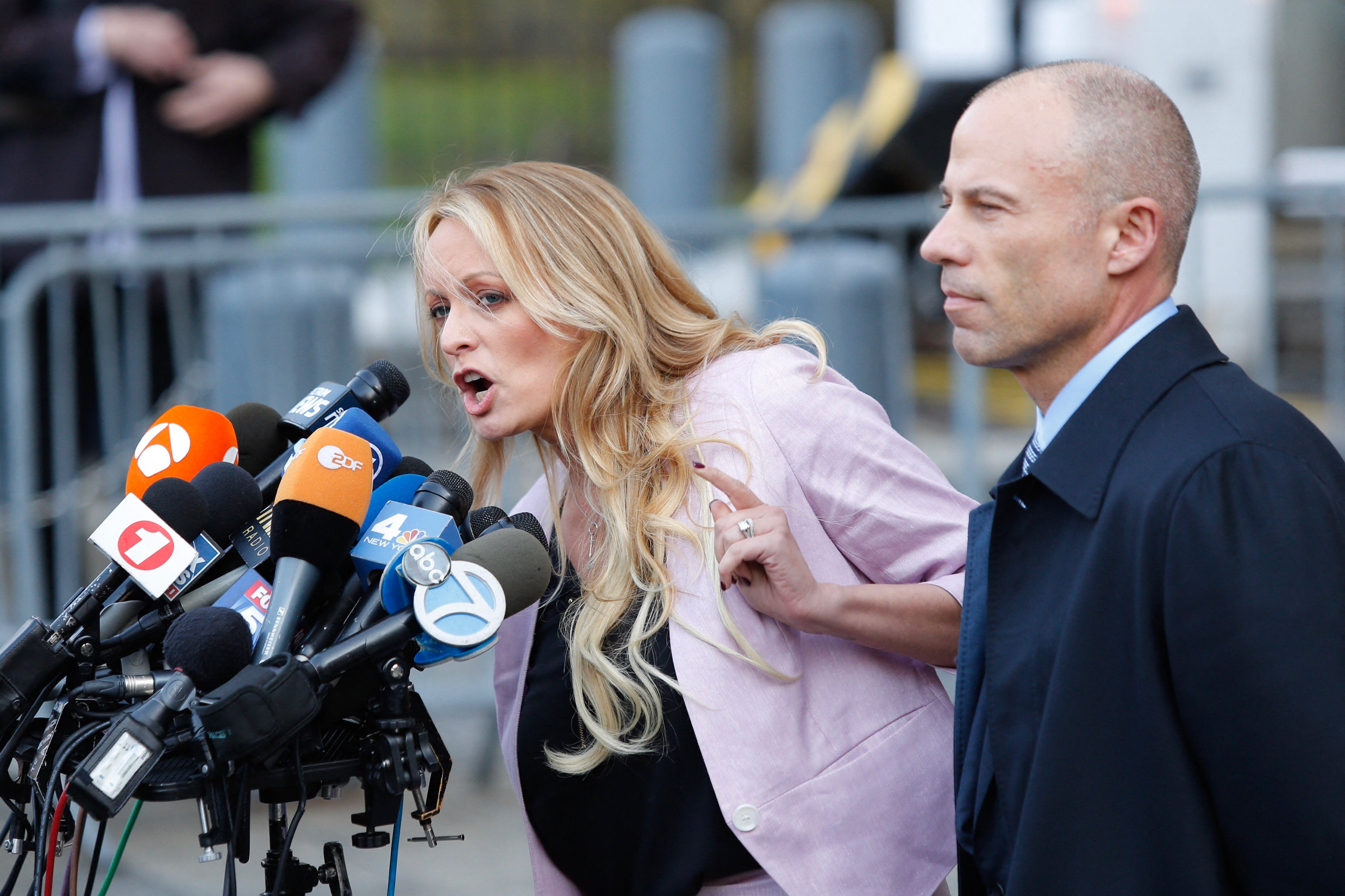
So Mr Pecker approached Mr Trump, telling him: “Michael Cohen is very concerned about this bonus this year and I want you to know he’s very loyal, he’s been working very hard from my perspective, I believe he’d throw himself in front of a bus for you.”
The former publisher recalled Mr Trump saying: “I don’t know what you’re talking about…. Michael Cohen has multiple apartments in my buildings. … He owns 15 taxi medallions.”
Mr Pecker testified Mr Trump then added: “Don’t worry about it. I’ll take care of it.”
Day four
Two sides spar over whether Trump deserves title of president
Early in the day on Friday, the two sides briefly sparred over whether or not Mr Trump deserves to go by the title of “president” during his trial.
The moment came about as Mr Trump’s defence attorney Emil Bove repeatedly referred to the defendant as “President Trump” when speaking about events prior to him taking office.
Prosecutor Joshua Steinglass tried to object saying: “He wasn’t president in June 2016.”
In opening statements on Monday, defence attorney Todd Blanche had told the jury that his legal team planned on referring to their client as “President Trump” because it’s a “title he has earned.”
Trump attorneys try to poke holes in Pecker’s testimony
During cross-examination, Mr Bove tried to cast doubt on the former tabloid boss’s lengthy testimony about the “catch and kill” scheme.
But despite multiple attempts to impeach Mr Pecker’s credibility, the former publisher repeatedly affirmed his under-oath descriptions of his meetings with Mr Trump.
At one point on Friday, Mr Bove tried to get Mr Pecker to admit that he either lied on the witness stand or to federal law enforcement about Mr Trump “thanking” him for his help burying stories of Mr Trump’s alleged affairs.
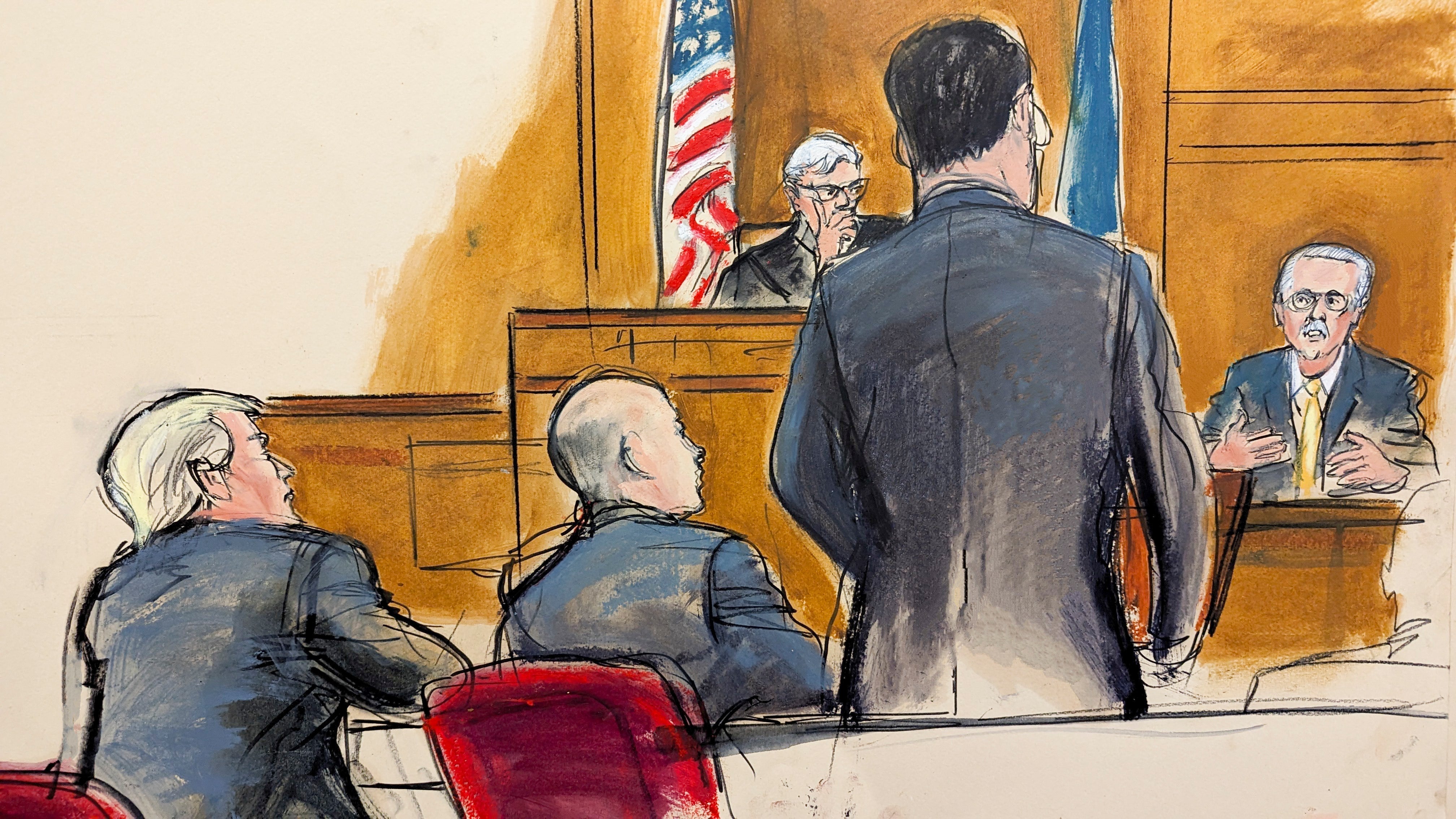
“Was that a mistake?” Mr Bove asked. “Do you believe Trump said that to you as we sit here right now?”
Mr Bove then handed Mr Pecker a report from his interview with federal prosecutors and the FBI in 2018, alleging that Mr Pecker’s prior testimony contradicted his earlier interview.
“This is the FBI’s interview, is that correct? These are the FBI notes? The FBI notes, some of these here, are wrong. I know what I testified to yesterday,” Mr Pecker said.
“I know what the truth is,” he added. “I can’t state why it’s written this way.”
Pecker doubles down that McDougal payment was made to help Trump’s election odds
Mr Pecker previously called his relationship with Mr Trump “mutually beneficial” — using his tabloid empire to identify “negative” stories about the then-2016 candidate in an effort to boost Mr Trump’s election chances.
However, the former AMI chief testified on Friday that one aspect of the agreement did not benefit him at all: the Karen McDougal story. That story was killed and the payment made with the sole purpose of helping Mr Trump’s election odds, he testified,
Mr Pecker repeatedly testified that stories about Mr Trump were big sellers for the National Enquirer. Burying Ms McDougal’s story was against his own business interest, prosecutors sought to point out.
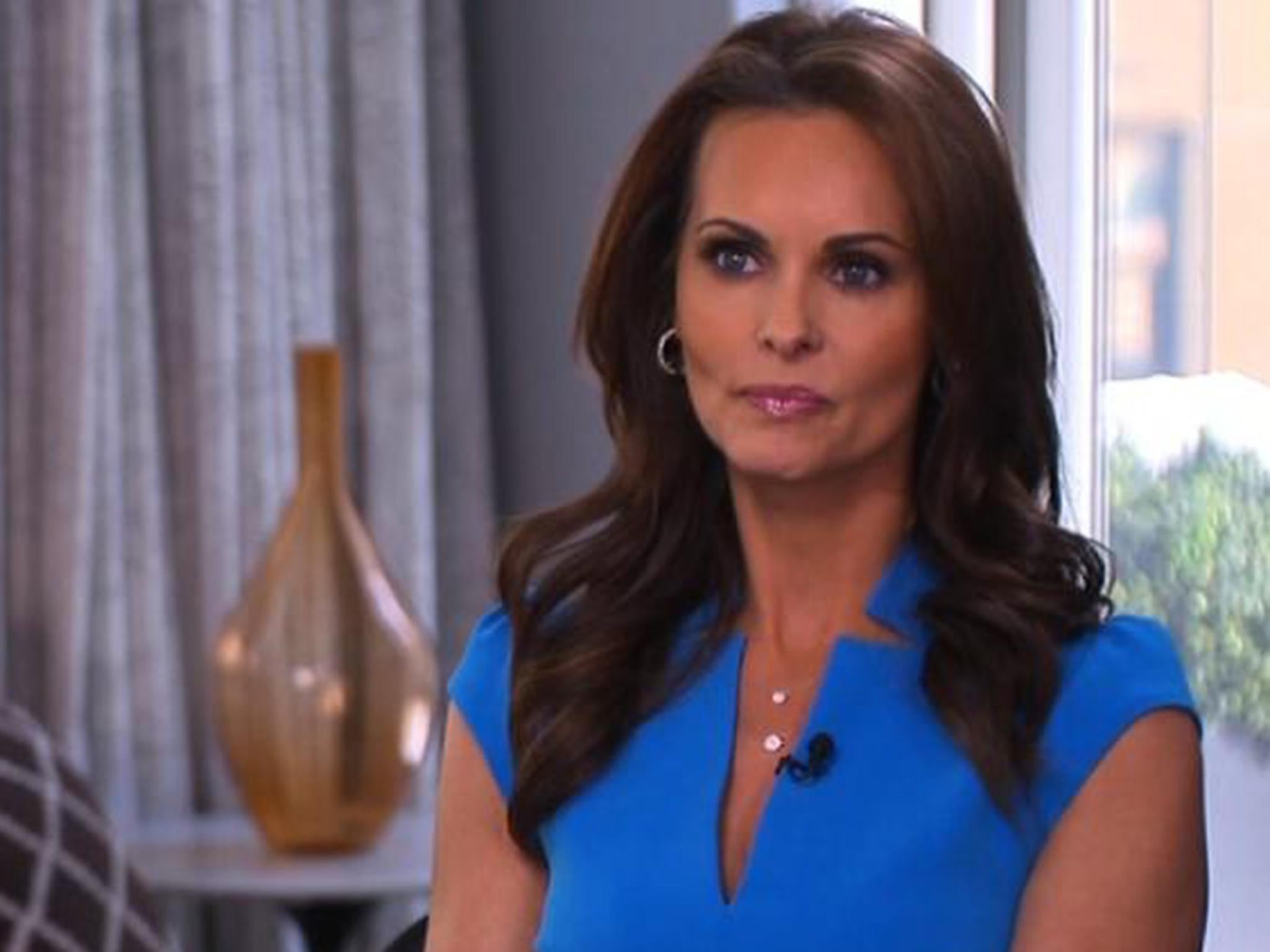
“Had you published a story about a Playboy model having a yearlong sexual affair while he was married … Would that have sold magazines?” Mr Joshua Steinglass asked. “That would be like, National Enquirer gold.”
Mr Pecker agreed.
At the time you entered into that agreement, you had zero intention of publishing that story,” Mr Steinglass said. “You killed the story because it helped candidate Donald Trump.”
“Yes,” Mr Pecker said.
Stormy Daniels Trump Tower visit - and Apprentice plans - revealed
Two new witnesses briefly took the stand on Friday.
The first was Rhona Graff, Mr Trump’s former personal assistant at the Trump Organization, who testified that she has a “vague recollection” of seeing Stormy Daniels at Trump Tower before his 2016 presidential campaign.
She assumed that Ms Daniels may have been at the office to discuss a role with The Celebrity Apprentice, Mr Trump’s former hit reality TV competition series on NBC, she said.
The network severed ties with Mr Trump in 2015 after his presidential campaign launch and his derogatory comments about immigrants.
Ms Graff recalled that Mr Trump believed Ms Daniels would be a “good contestant” on the show.
“I can’t remember a specific incident when I heard it. It was part of the office chatter,” she said.
Third witness takes the stand
Gary Farro, a banker assigned to Cohen at First Republic Bank, testified that Cohen urgently asked for his help setting up an LLC shell company while negotiating a hush money payment to Ms Daniels in 2016.
That account, Essential Consultants LLC, was used to wire Ms Daniels the $130,000 payment at the heart of the president’s criminal case.
Mr Farro will resume his testimony on Tuesday.
Elsewhere in Trumpworld…
Beyond the courtroom, there was a lot of other happenings in Trumpworld this week.
Civil fraud bond deal
On Monday, lawyers for Mr Trump and New York Attorney General Letitia James’s office reached a deal around the payment of his $175m bond in his civil fraud case, so long as the collateral remains in cash.
The AG’s office had previously expressed concerns about the underwriter Knight Specialty Insurance Company.
E Jean Carroll
On Thursday, a federal court upheld the verdict in former Elle columnist E Jean Carroll’s $83m defamation case against Mr Trump – rejecting his request for a new trial.
In May 2023, Mr Trump was found liable for sexually abusing Ms Carroll, and earlier this year, a jury determined that Mr Trump had defamed Ms Carroll, awarding her $65m in punitive damages and $18m in compensatory damages.
Supreme Court ‘immunity’ case
The Supreme Court heard oral arguments on Thursday in the landmark case involving the former president’s claims of presidential immunity from prosecution.
During oral arguments, the justices appeared poised to allow some, but not absolute, immunity. The case stems from special counsel Jack Smith’s federal indictment against Mr Trump, accusing him of engaging in efforts to overturn the 2020 presidential election and stay in the White House.
